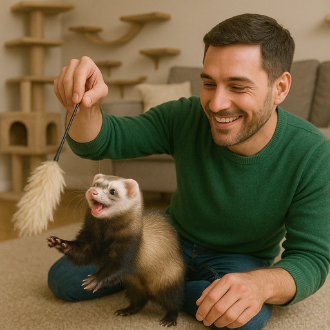The Fundamental Needs of Rodents: Ensuring Their Well-being and Development
By Lost'Him Team • February 22, 2025

Rodents are sensitive and intelligent animals that require special attention to live happily and healthily. Whether it's a hamster, guinea pig, rat, mouse, rabbit, gerbil, or chinchilla, each species has specific needs, but they all share fundamental requirements in terms of habitat, diet, care, and social interactions. Here’s a complete guide to ensuring your small pet’s well-being.
1. A Suitable and Secure Habitat
👉 Creating a comfortable and safe environment
- A spacious cage adapted to the species:
- Hamsters and gerbils need habitats with tunnels and hiding places.
- Rabbits and guinea pigs require large enclosures for free movement.
- Rats prefer tall cages with multiple levels for climbing.
- A safe and absorbent bedding material:
- Choose hemp, flax, or paper-based bedding and avoid softwood shavings, which can be harmful to their respiratory system.
- Hiding spots and resting areas:
- Every rodent needs hideouts to feel safe and reduce stress.
💡 A well-designed habitat reduces stress and promotes your rodent’s well-being.
2. A Balanced and Appropriate Diet
👉 Providing quality nutrition tailored to their species
- A fiber-rich diet:
- Hay is essential for rabbits and guinea pigs to maintain dental health and digestion.
- High-quality complete pellets prevent nutritional deficiencies.
- Fresh vegetables and fruits:
- Carrots, bell peppers, apples, zucchini, and endives (in moderation, depending on the species).
- Avoid seed mixes:
- Some rodents selectively eat only the most calorie-dense parts, leading to imbalanced nutrition.
- Constant access to fresh, clean water:
- Use either a water bottle or a stable dish, depending on your rodent’s preferences.
💡 A proper diet is essential for your pet’s health and longevity.
3. Regular Care for Their Well-being
👉 Monitoring health and ensuring veterinary follow-ups
- Proper dental care:
- Rodents' teeth grow continuously, so they need wooden chew toys, hay, and gnawing objects to prevent dental issues.
- Clean and well-maintained fur:
- Some rodents, like chinchillas, require dust baths to maintain their fur.
- Regular health checks:
- Monitor their weight, appetite, eyes, and behavior for early signs of illness.
- Consult a specialized exotic animal (NAC) veterinarian when needed:
- Not all veterinarians are experts in rodents, so finding a specialist is crucial.
💡 Regular monitoring prevents disease and ensures a good quality of life.
4. A Stimulating and Enriching Environment
👉 Providing toys and accessories to prevent boredom
- Chew toys: Applewood branches, natural wooden toys.
- Tunnels and platforms for climbing and exploring.
- A properly sized exercise wheel (without bars to prevent injuries).
- Regular supervised free-roaming time for rodents like rabbits, rats, and guinea pigs.
💡 A stimulated rodent is mentally balanced and healthier.
5. Proper Social Interaction
👉 Respecting the social needs of each rodent species
- Social animals (rats, guinea pigs, gerbils, chinchillas):
- They must live in pairs or groups to avoid loneliness and stress.
- Solitary animals (hamsters, some rabbits):
- They prefer to live alone and may become aggressive toward others.
- Daily interaction with their owner:
- Rats and guinea pigs enjoy human contact, while other species require patience and gentleness to be handled.
💡 Respecting each species’ social nature is crucial for their emotional well-being.
6. Maintaining a Clean and Hygienic Environment
👉 Ensuring regular cage cleaning
- Change bedding at least once or twice a week to prevent odors and infections.
- Disinfect the cage and accessories with pet-safe cleaning products.
- Regularly clean water bottles and food bowls to prevent bacterial growth.
💡 A clean environment helps prevent respiratory and digestive diseases.
Conclusion: Creating the Ideal Living Conditions for a Happy Rodent
- ✅ A secure habitat adapted to their species.
- ✅ A balanced diet including hay, vegetables, and high-quality pellets.
- ✅ Regular health care to monitor their well-being and prevent diseases.
- ✅ A stimulating environment with toys and enrichment activities.
- ✅ Social interaction suited to their needs.
- ✅ Excellent hygiene to avoid infections and illnesses.
💡 A well-cared-for rodent with its needs met is a joyful, balanced, and healthy companion! 🐹💛
 EN
EN  FR
FR